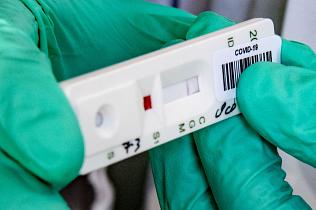‘Immunity Passports’ Could Create a New Category of Privilege
In one version of the future, a new type of test that measures antibodies would help restore a sense of normalcy for some people even as the coronavirus pandemic drags on. With the right antibodies, some may be immune to the virus, unable to get sick or spread the virus to others. Widespread testing for these antibodies could pave the way for so-called immunity certificates, which would allow people who have already been exposed to the virus to return to public life.
But the hope may be dashed by significant scientific and ethical concerns. For starters, diagnostic testing is already extremely limited in the United States, to say nothing of the more experimental antibody testing. Experts worry that antibody testing isn’t guaranteed to prove immunity. And if it does, the resulting immunity passports could be used to discriminate against untested people and those who aren’t immune — in the workplace, for example. That could lead people to intentionally expose themselves to Covid-19, banking on the hope that they’ll survive and earn the documentation they need to reenter society.
Despite those concerns, immunity certificates have been proposed as a way to begin reopening the economy in places around the world where daily life has come to a grinding halt because of the new coronavirus. Chile could become the first country to issue immunity certificates to people who have recovered from the virus, and public officials in Germany and Italy are also considering them. In the United States, even the country’s leading coronavirus expert, Dr. Anthony Fauci, director of the National Institute of Allergy and Infectious Diseases, has said the idea of immunity certificates might “have some merit under certain circumstances.”
“There’s a major ethical value in doing this to keep people safe while keeping the economy going,” Sean Aas, senior research scholar and a professor of philosophy at the Kennedy Institute of Ethics at Georgetown University, tells OneZero. But there are roadblocks to rolling out such certificates.
Immunity passports hinge on people getting a diagnostic test to know if they’re infected with Covid-19, since antibody tests are not yet reliable. People who have been diagnosed with the disease and recover from it could be the first in line for such certificates. But right now, most public health experts agree that the United States isn’t doing nearly enough testing to identify Covid-19 cases.
Testing to diagnose Covid-19 has been prioritized for health care workers, those who have been hospitalized for symptoms, and elderly adults. Meanwhile, those with mild symptoms are being told to stay home and are going untested. A doctor’s order is also needed for a diagnostic test. For people without health care or a primary care physician, getting access to testing could be a huge barrier to obtaining an immunity passport.
Unlike diagnostic testing, which shows a current infection, antibody testing would reveal whether a person has previously been infected with the virus, perhaps without knowing it. But the accuracy of these tests varies, and it’s not yet known whether they’re a true indicator of immunity to the new coronavirus.
“If we are going to use immunity certificates, we need to make sure they’re scientifically valid,” says Seema Mohapatra, an associate professor of law at Indiana University who focuses on health care.
Issuing immunity certificates based on faulty tests could be disastrous. False positives — in which a test result says people have coronavirus antibodies when they don’t — could lead people to believe they have immunity when they don’t. If they reenter society, they could spread the virus or get sick themselves. Even tests that accurately show that a person has coronavirus antibodies may not make them immune to the virus.
A person’s immune system makes antibodies when it encounters a pathogen it’s never seen before. These antibodies help fight off the infection, and they stick around in the blood afterward, often for months or years. If a person is exposed to the virus again in the future, those antibodies are primed to strike against it. Scientists think the presence of SARS-CoV-2 antibodies means a person could have full or partial immunity to the virus that causes Covid-19. But they don’t know for sure. The body can make different types of antibodies in response to a pathogen, and it’s not yet known which kinds of antibodies are needed to provide protection or how long they will last.
“We’re basically extrapolating from other coronaviruses and other diseases,” says Robert Fitzgerald, director of toxicology and associate director of clinical chemistry at the University of California, San Diego, who is involved in the health system’s effort to develop a coronavirus antibody test. “It makes sense that there would be some degree of immunity, but we don’t have enough experience with this virus to make that determination.”
Antibody tests could be helpful in identifying people who were infected with the virus without knowing it because they had either mild or no symptoms. People who test positive for the right antibodies could then be issued immunity certificates, allowing them to return to work and move about freely again.





